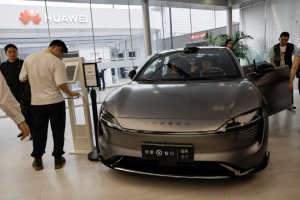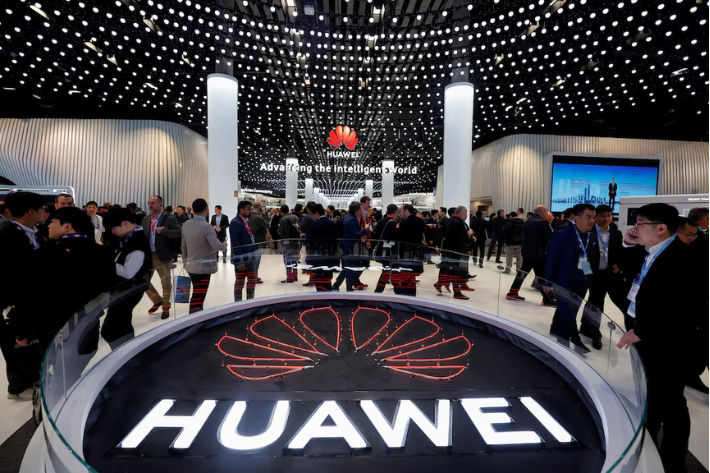Amid an increasing dominance of local carmakers in China’s crowded car market, Huawei’s newly launched intelligent driving technology is giving foreign brands a new way into the world’s biggest automobile market.
Huawei Technologies has two huge booths at this week’s Beijing Auto Show, and at least seven Chinese automakers are touting its Qiankun installed in their cars as the most sophisticated advanced driving assistance system (ADAS) to date.
“Huawei is currently leading in ADAS technologies,” Feng Xingya, General Manager at Guangzhou Automobile (GAC) told reporters on Thursday.
Also on AF: Local EVs Dominate as China’s Largest Auto Show Opens
GAC will launch flagship models under its Trumpchi brand from 2025 featuring Huawei’s smart vehicle technology.
“We chose them because we must make sure GAC products are equipped with the most advanced technologies for consumers,” Feng said.
But the allure of Huawei’s driving tech is not limited to Chinese carmakers alone.
Germany’s Volkswagen will equip its China-made, China-bound Audi Q6L e-tron with Qiankun upon the car’s 2025 launch, two people with knowledge of the matter told Reuters.
That would be Huawei’s first deal with a foreign automaker.
Nissan CEO Makoto Uchida’s interest was piqued too as he visited a Huawei booth and listened to representatives explain the systems developed for the Seres car on display. A Nissan spokesperson said Uchida was touring booths and had no comment on any considerations of a Huawei tie-up.
Separately, three managers at foreign automakers said Huawei is seen as a potential partner worth serious consideration for foreign brands in China despite difficulties with Western governments.

Managers said Huawei’s ability to make its own chips raises its appeal, as decoupling could see further trade restrictions which would otherwise impact China strategies.
Automakers “may end up partnering with Chinese firms to provide driving automation for the vehicles targeting the Chinese markets. Huawei can benefit from such opportunities whereas other ADAS providers, eg, Bosch, may not have them in China in the same way they have them in Europe or the US,” said Evangelos Simoudis, an investor and corporate adviser.
Apple of legacy carmakers’ eye
Huawei’s rapid emergence as a parts supplier highlights the telecommunications equipment maker’s drive for sources of growth after US sanctions since 2019 hammered its businesses.
It’s taken Huawei just four years to become a force in smart car technology. The carmaker has perviously said it aims to become a top-tier automotive supplier for the intelligent EV era, competing with the likes of Bosch, Denso and Continental.
Aito, the new energy vehicle (NEV) brand backed by Huawei, ranked sixth among new energy brands in China in the January-March quarter.
Huawei’s market entry has been smoothed by the sheer pace of development in China’s EV industry.
Legacy automakers have struggled to keep up with EV manufacturers such as BYD who are packing one-time premium features into cars as cheap as $20,000.
Private EV makers like BYD have proven adept at developing high-tech capability in-house, whereas state-owned stalwarts have struggled to innovate and so count on the likes of Huawei to boost competitiveness, analysts said.

State-owned Changan, Dongfeng and BAIC have all equipped their new EV brands such as Avatr, VOYAH and Arcfox, with Huawei’s ADAS.
Other technology Huawei showed off at the auto show included vehicle control units that calibrate ride and suspension, LIDAR, telematics sensors using BeiDou and GPS navigation, optical sensors and an audio system built into head rests so occupants can enjoy different music without disturbing each other.
Not all rainbows
Despite those strengths, and weaknesses partnership with Huawei comes with its own headaches for carmakers.
Huawei has been heavily involved in the development and promotion of Seres Aito and other vehicles, which the three managers and a fourth person said has raised concern in the industry that Huawei is not only a supplier but also a rival.
The company also had a computing component supply crunch this year that delayed deliveries of flagship models including the Seres Aito M9, Changan Avatr 12 and Chery Luxeed S7.
Beyond China, Huawei could again find itself impacted by trade restrictions as the US this year began investigating whether Chinese vehicles are a national security risk, particularly due to concern about “connected” car technology.
None of Huawei’s automaker partners have announced plans to export models equipped with Huawei technology.
- Reuters, with additional editing by Vishakha Saxena
Also read:
Huawei Revs Up Intelligent Driving Push With Software
Huawei Eyes Western Backing for EV Firm as Sanctions Safeguard
Year of Wins Propels Huawei From ‘Survival’ to $100bn Revenue
Huawei Profits Jump 144% in Fastest Growth Since US Sanctions
Raimondo Says Chinese EVs Are a National Security Risk For US, EU
Huawei To Build First Euro Factory Despite EU Scrutiny
Huawei Eyeing Autonomous Driving Dominance Next – ThinkChina
























